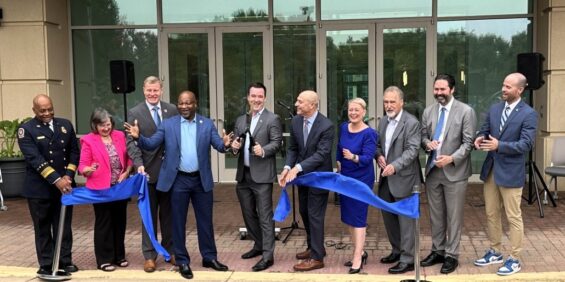
Industrial Revenue Bonds (IRBs)
Amplify Your Impact
FCEDA Connects Businesses to Game-Changing Resources
Whether you’re a small manufacturing facility or a non-profit 501(c)(3) business, Fairfax County Economic Development Authority (FCEDA) is your partner in identifying commercial real estate and financing opportunities that connect you to one of the strongest economies in the world. Pursuant to Chapter 33, Title 15.1 of the Code of Virginia, the Fairfax County Economic Development Authority (FCEDA) has the authority to approve conduit tax-exempt revenue bonds (IRBs) for the financing of qualifying capital projects for certain applicant organizations.
IRB Resources
Internal Revenue Bonds (IRB), Eligibility and Terms
 To carry out its purposes of promoting industry, developing trade and promoting the safety, health and welfare of the residents of Virginia, FCEDA has the legal authority to issue its conduit tax-exempt revenue bonds to be used in financing the acquisition, construction or equipping of various types of qualifying Applicant capital projects and facilities. In order to qualify for an EDA Revenue Bond, generally speaking, an Applicant and its capital project must be one of the following:
To carry out its purposes of promoting industry, developing trade and promoting the safety, health and welfare of the residents of Virginia, FCEDA has the legal authority to issue its conduit tax-exempt revenue bonds to be used in financing the acquisition, construction or equipping of various types of qualifying Applicant capital projects and facilities. In order to qualify for an EDA Revenue Bond, generally speaking, an Applicant and its capital project must be one of the following:
(1) a facility owned and used by a non-profit 501(c)(3) entity
(2) a small, for-profit “manufacturing facility”, as defined by the Internal Revenue Code.
Two of the most important features of an EDA Revenue Bond are, first, that the interest earned on the bond is exempt from Virginia and Federal income taxation and, second, that the bond is payable only from revenues of the Applicant and any security the Applicant pledges to repay the bond. The tax-exemption on the interest on an EDA Revenue Bond allows a lender or investor to offer debt financing to the Applicant at a significantly lower rate of interest. By serving as the conduit revenue bond issuer to the Applicant’s lender or investors, the FCEDA allows the Applicant to access this tax-advantaged, lower interest financing. However, the FCEDA, Fairfax County and the Commonwealth of Virginia are not responsible in any way for the repayment of the bonds.
The IRB Application Process
 While there may be some variation in the timing and sequence of events leading up to issuance of the bonds, the EDA Revenue Bond process normally proceeds as follows:
While there may be some variation in the timing and sequence of events leading up to issuance of the bonds, the EDA Revenue Bond process normally proceeds as follows:
Week 1
- The Borrower decides to construct or renovate a facility in Fairfax NOVA (the “Project”).
- The Borrower consults with the FCEDA’s staff and Bond Counsel who determines that the Project qualifies for financing under federal and state laws and that the interest on the Bonds will be exempt from state and federal income tax.
- The Borrower goes to a bank or investment banking firm and formally requests a commitment to purchase or place the Bonds.
- The bank or investment banking firm analyzes the Project and the financial strength of the Borrower to repay the Bonds and, if it agrees to finance the Project, structures credit requirements (collateral, insurance, ratings etc.)
Week 2
- The Borrower completes and files an application requesting the FCEDA to issue its Bonds in an amount estimated to cover the cost of acquisition, construction, renovation and equipping of the Project.
Week 3
- Bond Counsel prepares a resolution (the “Inducement Resolution”) to be presented to the FCEDA approving the application and publishes a notice of public hearing with respect to the Project.
Week 5
- Following newspaper notice coordinated by Bond Counsel (once a week for two successive weeks), the FCEDA holds a public hearing on the Project, and if the application is in order, adopts the Inducement Resolution.
Week 6
- The Inducement Resolution and certain documentation prepared by Bond Counsel are forwarded to the Board of Supervisors for approval.
Week 7
- The Board of Supervisors meets and adopts a resolution approving the bond issue. This approval must occur within 60 days following the date of the FCEDA public hearing described above.
Week 7-10
- Bond Counsel prepares bond documents and a final resolution authorizing the issuance of the Bonds. The final resolution and bond documents are reviewed by all parties to the transaction and revised documents are circulated. All documents are finalized.
Week 10
- The final resolution authorizing the issuance of the Bonds is adopted by the FCEDA.
Week 12
- All parties meet to execute the bond documents and close the bond issue.
- The Borrower agrees to make all payments of principal and interest on the Bonds and the FCEDA has no obligation to make payments on the Bonds or to pay costs of the Project.
- At closing, the bond proceeds are deposited in a special account to be used by the Borrower to pay for costs of acquisition, construction, renovation and equipping of the Project. Only 2% of the bond proceeds may be used to pay for issuance costs.
- Although a bond issue typically follows these steps, each financing is unique and the procedures may vary depending on individual circumstances. The foregoing may take more time, depending upon complexity of transaction.
Featured News

From Startups to Scale-Ups: Fairfax + NOVA Businesses Shine on Inc. 5000
Companies Celebrate Relocations, Expansions in Fairfax County
